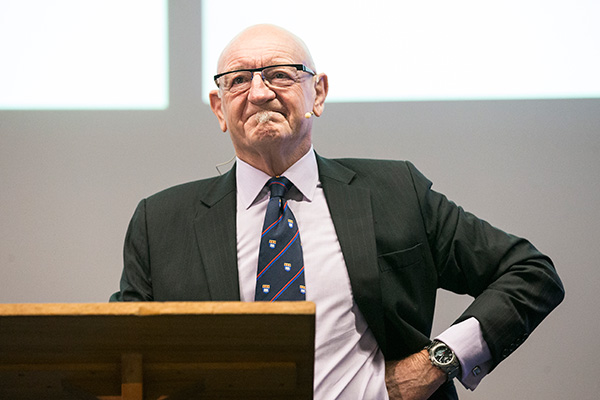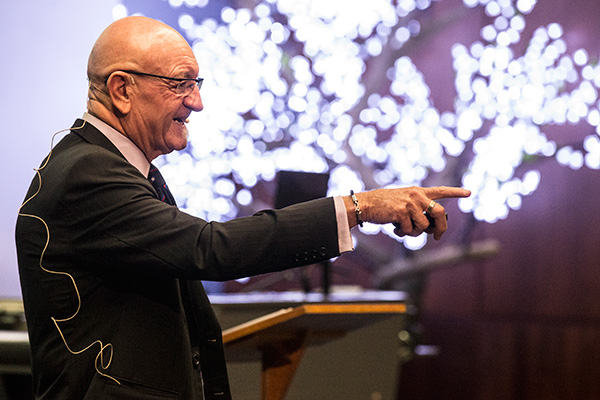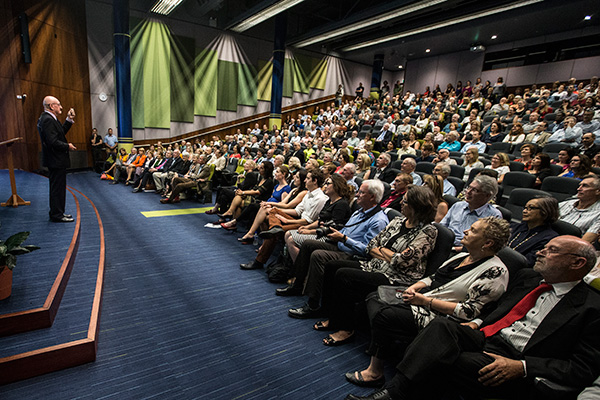December 15, 2014
Patterson scholarship maintains the power of education
University of Wollongong Senior Deputy Vice-Chancellor Professor John Patterson knows first-hand the transformative power of education.

On Friday night (December 12) at a farewell lecture to more than 250 guests to mark his retirement after 40 years at UOW, Professor Patterson told how education had changed his life.
"Education changes lives, and I am the living embodiment of that," he said.
Now he is preparing to help it change other lives.
Vice-Chancellor Professor Paul Wellings announced that Professor Patterson had contributed $20,000 to establish a scholarship fund to help future students attend UOW.
Professor Wellings and former Dean of Education Emeritus Professor Barry Harper both spoke glowingly of Professor Patterson's contribution to UOW over four decades, while Executive Dean of the Faculty of Engineering and Information Sciences Professor Chris Cook gave a light-hearted tribute in the "Ballad of Big, Bad John".
In a 40-year career at UOW Professor Patterson has seen many thousands of students – many of them the first generation of their families to attend university, and many of them the children of migrants who came to Australia to give their children a better chance in life – graduate and go on to forge successful careers.
But the power of education to change lives really hit home to him in a very personal way on the Queen’s Birthday weekend in 2010, when he was representing UOW at a black tie State Reception at Government House in Sydney.
Having greeted the Governor Professor Marie Bashir and her husband Sir Nicholas Shehadie, both of whom he knew, he stood on the lawns of Government House looking out across Sydney Harbour and the city skyline.
He admits be became emotional as he looked down at the old NSW Public Works Building across the road, where his father had worked as a cleaner.
“Dad’s ‘office’ was a broom cupboard under the stairway,” he said. “As I looked down on that building I started crying. Here I was standing on the lawns of Government House at a reception for the glitterati of Sydney, looking down on a building where my father had worked for many years as a cleaner so that I could get a good education.
"Here I was, an archetypical working-class kid, standing on the lawns of Government House because of the opportunities education had provided for me,” he said.
“Without that education, I wouldn’t have been standing there. It really bought home to me what that education had done for me, where it had taken me. It was a very emotional moment.”

Professor Patterson said he had seen many similar stories of people whose lives had been transformed by education in his time at the University.
“I haven’t had a job … I have had a privilege. It has been an incredible privilege to have been involved in this University and in this community for four decades, and to be able to participate in such a fine institution that has had, and continues to have, such an influence on people’s lives,” he said.
“I have been incredibly fortunate to have been the beneficiary of education, and to be able to work in education. A lot of students here (at UOW) come from working-class backgrounds just like me, so I have gained a lot of satisfaction from seeing their success. Does it get any better? I don’t think so.”
Professor Patterson grew up in Balmain, when it was working-class suburb far removed from the trendy address it is now, attending Fort Street Boys High School before training as a PE teacher at Sydney Teachers College.
After working at National Fitness Camps and schools in Australia, he had a working holiday in Canada where his jobs included teaching and stints as a professional trapper and a tourist guide.
He then returned to Australia, moving to Wollongong in 1974 to work as a PE lecturer at the Wollongong Institute of Education the year it changed from being Wollongong Teachers College.

He became part of UOW when the University and Institute of Education merged in 1982 and has not looked back. After completing a PhD at the University of Colorado in 1986, he began a steady climb up UOW’s academic and executive ladder.
He was appointed Deputy Dean of Education in 1986 and Dean in 1993. In 2000 he became Dean of Health and Behavioural Sciences and in 2001 Deputy Vice-Chancellor (Operations). Since 2010 he has been Senior Deputy Vice-Chancellor.
Professor Patterson is proud of his longevity at UOW, an institution he has helped mould as it has developed over the years.
“In this age of short life spans and limited longevity, I consider working at the same institution for 40 years a badge of honour,” he said. “I hope I have made a contribution, and (in return) it has given me a great career path, intellectual challenges and the opportunity for emotional growth.”
In his farewell lecture, Professor Patterson spoke of the culture that had developed at UOW over the years thanks to great people who had contributed to its development. He acknowledged his many mentors over the years.
"The essential UOW is its people, not its bricks and mortar," he said. "The people are its essence, its fabric, its soul.
"Do not lose the passion and, above all, do not lose the culture," he implored.
The large crowd gave the man affectionately known as "Patto" a standing ovation at the end of his 90-minute lecture.